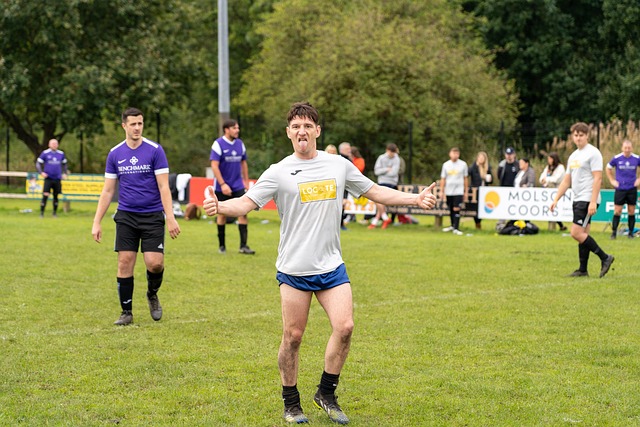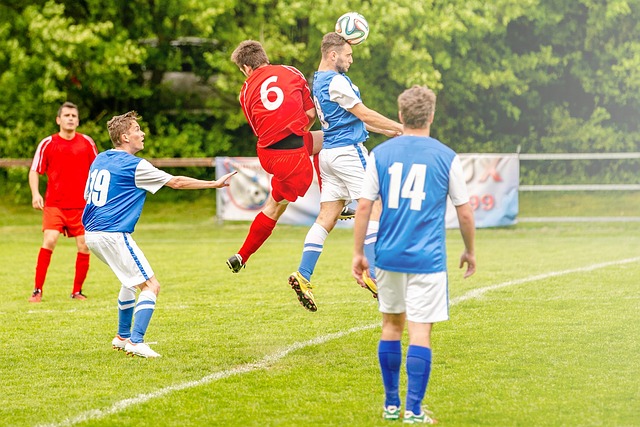The Ducks NCAA soccer team's success stems from its vibrant cultural fabric, built on respect, teamwork, and diversity. This shared identity strengthens on-field performance through strategic communication and resilience while fostering inclusivity and personal growth among players from varied backgrounds, setting them apart in the competitive NCAA landscape.
“Ducks soccer team stands as a microcosm of diversity and unity within NCAA soccer leagues. This article delves into the intricate dance between culture, values, and performance, exploring how these factors shape the team’s identity. From understanding the diverse cultural fabric to examining the impact of inclusivity, we uncover the secrets behind their success on and off the field. By focusing on shared values and embracing diversity, Ducks soccer team serves as a model for fostering winning strategies in NCAA competitions.”
- Understanding the Team's Cultural Fabric
- Values That Drive Performance on and Off the Field
- The Impact of Diversity in Player Experience
- Fostering Inclusivity: A Key to Success in NCAA Soccer Leagues
Understanding the Team's Cultural Fabric

The cultural fabric of a college soccer team like Ducks, competing in the NCAA soccer leagues, is a dynamic and multifaceted aspect that significantly influences its performance and unity on and off the field. Beyond the tactical strategies and skill development, the shared values and cultural norms foster a sense of belonging and camaraderie among players. Understanding this cultural tapestry involves recognizing the diverse backgrounds, traditions, and beliefs that contribute to the team’s identity.
Each player brings their unique heritage, shaping their perspective and approach to the game. These individual threads interweave to create a collective spirit, where respect, teamwork, and dedication become the cornerstone of the Ducks’ success. Embracing cultural diversity not only enriches the team’s experience but also equips them with valuable insights for navigating challenges and celebrating victories together within the competitive landscape of NCAA soccer.
Values That Drive Performance on and Off the Field

The culture and values within a sports team play a pivotal role in its success, especially in competitive environments like the NCAA soccer leagues. The Ducks soccer team has cultivated a unique identity that extends far beyond the pitch. Their core values, deeply ingrained in their team ethos, are what drive both on-field performance and off-field camaraderie.
Respect, resilience, and teamwork are the pillars supporting this high-performing unit. On the field, these values translate into unwavering support among teammates, fostering an environment where each player feels valued and empowered. This sense of unity allows for strategic communication and quick problem-solving during intense matches. Off the field, the team’s commitment to respect extends to their interactions with opponents, officials, and supporters, promoting a culture of sportsmanship. Resilience is evident in their relentless pursuit of improvement, both individually and collectively, which has led to consistent successes in NCAA soccer leagues.
The Impact of Diversity in Player Experience

The diversity within the Ducks soccer team extends far beyond the field, encompassing a rich tapestry of cultures and backgrounds that enriches the player experience. In the dynamic environment of NCAA soccer leagues, where teams often travel across countries to compete, exposure to varied perspectives fosters an inclusive atmosphere. Players learn not only from their coaches but also from one another, broadening their horizons and challenging preconceived notions. This cultural exchange not only enhances on-field performance but also prepares them for the global sporting stage they may eventually grace.
Diversity acts as a powerful catalyst for personal growth and team cohesion. In the bustling environment of practice sessions and matches, players from different ethnicities, languages, and life experiences come together to create a unique bond. It encourages open communication, fosters empathy, and promotes understanding—all vital components in achieving success on and off the pitch. This diverse player base reflects the broader community they represent, making their journey together both meaningful and memorable within the NCAA soccer leagues.
Fostering Inclusivity: A Key to Success in NCAA Soccer Leagues

In the vibrant world of NCAA soccer leagues, fostering inclusivity has emerged as a game-changer, transforming teams from mere collections of athletes into cohesive, powerful units. This strategy goes beyond simply recruiting players from diverse backgrounds; it involves creating an environment where every individual feels valued and respected for their unique contributions. By embracing cultural differences and promoting equal opportunities, Ducks soccer team has not only enhanced its on-field performance but also cultivated a rich tapestry of experiences and perspectives.
Inclusivity fosters a sense of belonging, encouraging players to bring their authentic selves to the pitch. This, in turn, enhances teamwork, as players learn to dance together, leveraging each other’s strengths while mitigating weaknesses. As the team navigates the hustle and bustle of NCAA soccer leagues, fostering inclusivity becomes not just a moral imperative but also a strategic advantage, setting them apart from their rivals and paving the way for sustained success.






